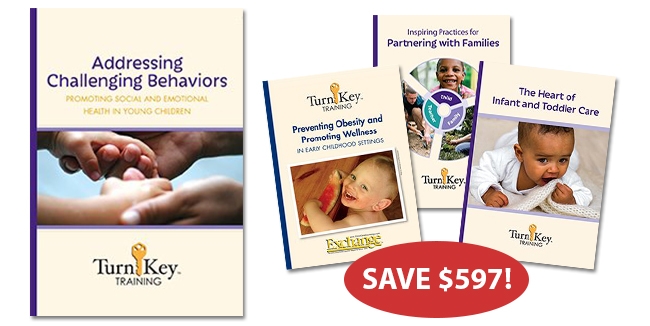ExchangeEveryDay Past Issues
 << Previous Issue
| View Past Issues | | Next Issue >>
<< Previous Issue
| View Past Issues | | Next Issue >> -Paulo Coelho
In the third edition of her popular book, Challenging Behavior in Young Children, Barbara Kaiser, who is one of the experts featured in the Exchange video training resource, Addressing Challenging Behaviors, gives this explanation of "Why should we include children with challenging behavior?":
"If children are going to learn to function in society, they must be in society. A child who interacts everyday with his socially competent peers has many opportunities to learn appropriate ways to learn appropriate ways to behave; and being accepted in a caring , nonviolent classroom community where everyone supports his attempts to act appropriately increases the chance that he'll meet those expectations....Including children with challenging behavior is the right thing to do...."

|





Comments (2)
Displaying All 2 CommentsPennsylvania, United States
Francis makes an excellent point. We as early childhood educators know that the social-emotional skills are so important. Learning how to be a member of the classroom community is such an important skill. The classroom should be a safe, nurturing environment for all of the children. That being said, there needs to be more than adequate adult support for the children in the classroom. Not only is our national focus incorrectly placed on academic outcomes but our ratio requirements are much too low for my liking. I am so fortunate to direct and teach a small preschool (not a daycare), 20 children - four teachers, and some days I think we still need more adults. So many of the children just want to talk, play, and interact with the teachers and if you have a child with challenging behaviors, you could certainly use extra sets of hands to help. So in most instances, the law says two teachers are adequate for 20 preschoolers, and so you do the best you can---challenging behaviors and all. Obviously, in most schools/daycares finances restrict the addition of more teachers, but the children deserve it.
CSBC
Denver, CO, United States
While I totally agree with the message here, the "elephant in the room" is the fact that in the past programs focused on social and emotional development; now, due to the emphasis on inappropriate standards and frameworks, they are required to focus on discrete academic outcomes. The net result is less time and energy devoted to important social and emotional development, and the need to get rid of behavioral distractions to concentrate on these academic outcomes.
Post a Comment